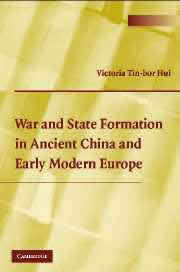
Tin-Bor Victoria Hui, a political scientist at the University of Notre Dame, has received the 2005 Edgar S. Furniss Book Award from Ohio State Universitys Mershon Center for International Security Studies for her first book, titledWar and State Formation in Ancient China and Early Modern Europe,(Cambridge University Press, 2005).
Challenging the Eurocentric conventional wisdom which holds that the West is unique in having a multi-state system in international relations and liberal democracy in state-society relations, Huis book explores the ancient period whenChinawas a system of sovereign territorial states similar toEuropein the early modern period. This systematic comparison blends Eurocentric and Sinocentic perspectives, examining whyChinaandEuropeshared similar processes but experienced opposite outcomes.
Victoria Hui is perhaps the only person in the international relations field capable of writing such a sophisticated comparative history of the Chinese and European state systems,says Alastair Iain Johnston, a professor of Chinese atHarvardUniversity.The result is a provocative argument about the importance of strategic amorality, ruthlessness, and resource mobilization in state building, and about why ancient Chinese states outperformed European states in these areas.
A member of the Notre Dame faculty since 2004, Huis areas of specialty include the dynamics of international politics and the origins of constitutional democracy.She earned her masters and doctoral degrees fromColumbiaUniversity.
OhioStateMershonCenterfor International Security Studies fosters theunderstanding of national security in a global context. Its Furniss Book Award is given annually to an author whose first book makes an exceptional contribution to the study of national and international security and influences the understanding of the use of force and diplomacy; ideas, identities and processes that affect security; and institutions that manage violent conflict.
TopicID: 18762